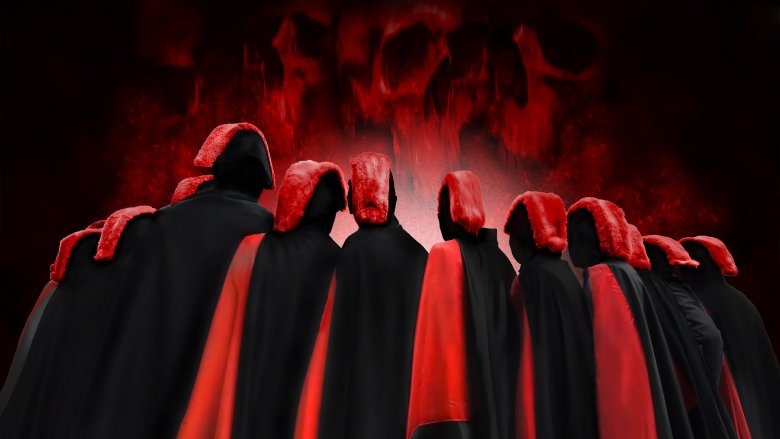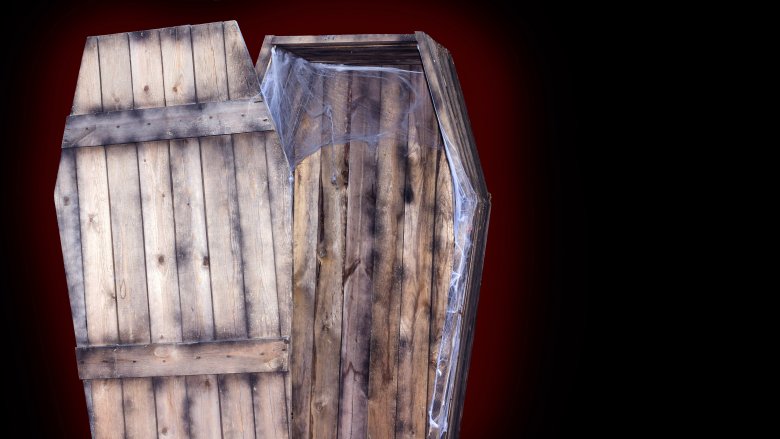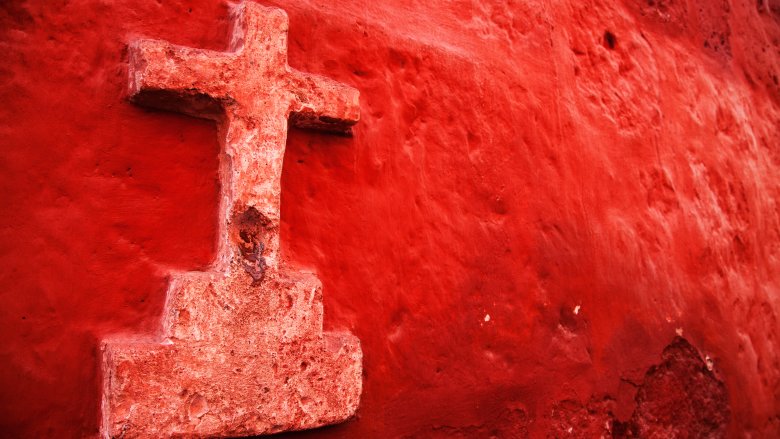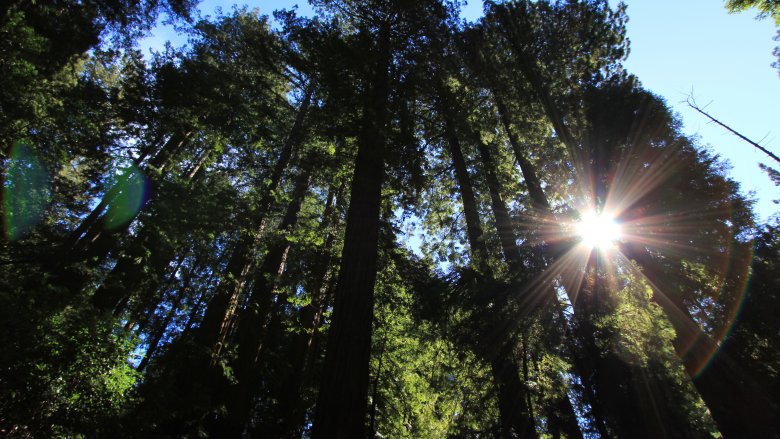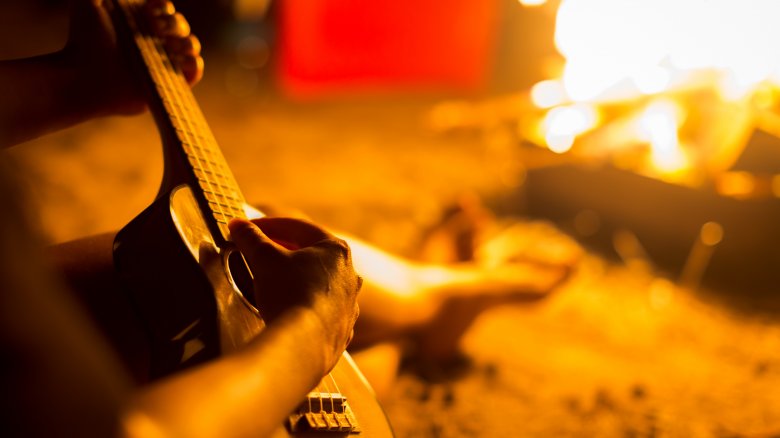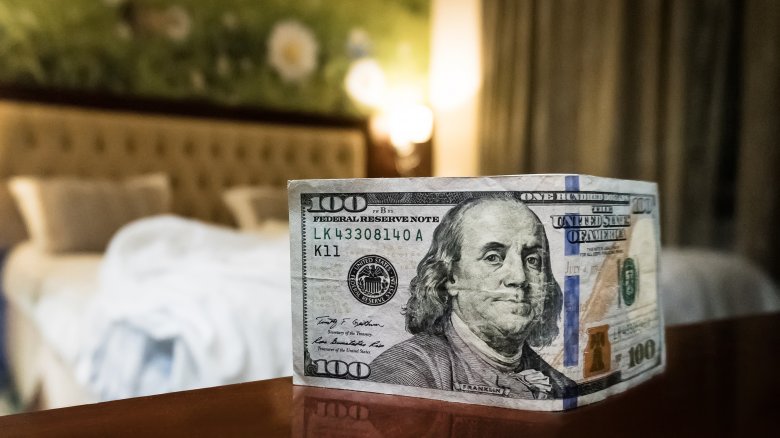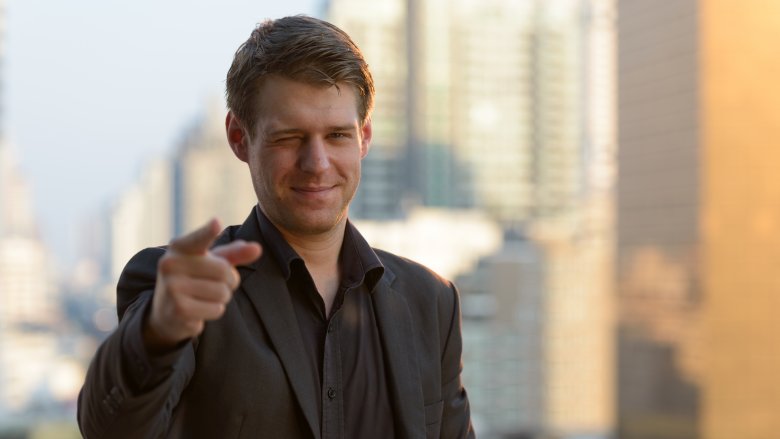What Really Goes On At Bohemian Grove
Sometimes, conspiracy theories are true.
While it might seem incredibly far-fetched to say there's a secret cabal of ultra-powerful men who meet at an exclusive camp deep in the forests of California to bond over rites and rituals to which only the select few are privy, well ... it's true. They're called the Bohemian Club, and they were built on the shoulders of a private gentlemen's club that first met in San Francisco in 1872. According to Business Insider, they purchased the land where Bohemian Grove now stands in 1899, and every year, the most powerful men of business and politics head out there for an annual retreat.
There's no doubt that the Bohemian Club is for the upper class — there's a waiting list miles long to join, and once your name comes up, applicants should be prepared to drop $25,000 just for the privilege of joining. (That's not including annual dues, and only a few U.S. presidents have ever been members — it's that exclusive.) There are all kinds of stories of bizarre behavior, occult rituals, and secret dealings, and the not-so-privileged have made some major attempts to find out just what goes on in the secret enclaves in the forest.
Weaving Spiders Come Not Here
First, it's worth mentioning what's not supposed to go on there — any kind of business deals. Everyone who attends the retreat is told, "Weaving Spiders Come Not Here," which essentially means that no matter who you are, who you meet, or what your agenda in the real world is, deals aren't to be made at camp. There's one notable exception, says the Washington Post, and that happened in 1942 when norms of all kinds were temporarily suspended.
And even that's a "sort of." The Bohemian Club owns Bohemian Grove, and the super-secret camping trip that happens every year only goes on for a handful of days. For the rest of the year, any members of the Club can use the grounds for whatever they want, and according to Skeptoid, Dr. Edward Teller reserved the grounds in September 1942. Teller — who was a club member — would go on to be forever known as the "father of the hydrogen bomb" (via Scientific American), and the groundwork for the Manhattan Project was laid there.
But here's the thing — Teller was the only member of the Bohemian Club there, so it can't really be said club members were out there planning world domination. Are they?
Pageantry, theater, and not a little bit of cross-dressing
In 1989, Spy Magazine writer Philip Weiss wrote extensively (via Who Rules America) on what he'd heard and seen when he snuck into Bohemian Grove for one of their annual retreats, and said the high point of the weekend was the theatrical performances — particularly the lowbrow version called The Low Jinks. He went on to describe it this way: "The humor was not just lame but circa-1950s college follies lame."
The year Weiss snuck in, the play featured a gallery owner and an artist who debate whether the art world is ready for sculptures made entirely of garbage. It was hilarious to the sort of men who spent a fortune on the kind of art no one really understands, and also hilarious was the cross-dressing, secretaries referred to as "heifers" (who were mooed by the crowd), and a showgirl named Bubbles Boobenheim. Weiss also added that the one-time production cost a whopping $75,000.
Then, there's the High Jinks. According to Theatre West, the more formally named Grove Play is more serious. They've staged performances of St. Patrick at Tara, recited hundreds of poems, tackled subjects like the triumph of Christianity over Druidic paganism, and Jack London even wrote an original piece for the High Jinks (which was never staged). Costs go up well over $100,000 per performance, and it must be nice to have that kind of cash.
The Cremation of Care
Every annual meeting in Bohemian Grove has, since 1880, kicked off with a ceremony called The Cremation of Care — and it's easy to see how it could be mistaken for some sort of occult ritual. According to The Bohemian Grove and Other Retreats, the ceremony starts with a parade of men dressed in red, hooded robes, some carrying torches, some carrying a wooden box with the effigy of a human body inside.
It's a wooden skeleton named Care. The procession winds though camp until they make their way to the side of a lake watched over by a massive cement owl, and as spectators gather, the men playing the priests extinguish the torches. Others appear, playing tree spirits who appeal to attendees to leave all the cares of the real world behind. They sing a song, a priest tells members: "Shake off your sorrows with the City's dust and scatter to the winds the cares of life," before invoking a remembrance of friends lost and putting the corpse of Care on the Ferry of Care.
Care makes it to the altar then makes an appearance as a force that threatens to intrude on the mirth and merriment of the camp, but the Owl lends a helping hand and the funeral pyre is lit. The dull cares of the world are gone — at least for a little bit — and attendees head back to camp to embark on a week of merry-making.
Saintly secrecy
The rituals and plays put on at Bohemian Grove are inspired by all sorts of mythology, folklore, and religion, but there may be a connection there to the Vatican.
The Grove has a patron saint: Saint John of Nepomuk. UNESCO has protected his Pilgrimage Church, built in the Czech Republic during the 18th century to honor the 14th-century martyr.
What does that have to do with a bunch of rich guys hanging out in the California forests? It's all a reminder of how important secrecy is. According to legend, Saint John became a saint because of his devotion to preserving the sanctity and secrecy of the confessional. The secrets he refused to share were those of Queen Johanna of Bohemia, so it makes sense that he would become a patron of the businessmen, politicians, and power players of Bohemian Grove. They take their privacy very seriously, after all, and go so far as to ban recording devices. Sophie Weiner worked there for a summer (via Gawker), and says no cell phones were allowed. Other summer workers remember seeing cell phones destroyed in front of the offending member if they were snuck into the camp.
Not as much intrigue as you'd think
Sophie Weiner worked at Bohemian Grove for a summer (via Gawker), doing some of the handful of jobs available to women after a 1980s lawsuit where the California Supreme Court ruled that things needed to change and women needed to be not so discriminated against as far as employment in the camp. She and her peers — most of whom were between 19 and 21 years old — got an up-close and not-so-flattering look at what really went on there. According to them, it was more entitlement and bad behavior than intrigue.
The staffers were required to call attendees "gentlemen," which had to be difficult after seeing so much public urination. The dress code was strict, tattoos had to be covered with bandages, and piercings had to be removed ... all in preparation for dealing with men used to getting their own way who weren't afraid to berate the staff who were following the rules.
"The a**hole customer yelling at you about something out of your control could be our next president," Weiner said. "Or it could be Jeb Bush."
And that happened, over a milkshake. Even going to Harvard didn't improve their chances of getting treated with any more respect. When one employee working at the Dining Circle was asked what her plans were and shared she was going to Harvard, the response was less than awesome: "I didn't think people like you went to Harvard."
The line no woman can pass
The Bohemia Club was a boys' club from the start, and it wasn't until a 1986 lawsuit that rules were rewritten to allow the hiring of women as employees during the retreat. (Not as members or anything, that would be just downright anarchy.)
The Club had attempted to argue "that male gender is a bona fide occupational qualification," much like Hooters argued that being a female with a certain body type was a job requirement for being a server there. The Bohemian Club was less successful than the restaurant chain when it came to their lawsuit, and they were forced to open hiring practices to female employees.
Of course, there's a "but." Club members weren't about to allow women to just have access to all their camps and cramp their style, so jobs for women were restricted to the Dining Circle and valet parking. Former summertime employee Sophie Weiner said these jobs were the lower-paying ones, and that there was a very literal line on the ground that marked the place where women needed to stop. And yes, this was in the 21st century.
No small amount of illegal logging
The Bohemian Club owns 2,700 acres of redwood forests, and only a small amount of the property has been turned into a retreat. Vanity Fair and Alex Shoumatoff suggest there's been something else going on outside the carefully-groomed camp for a long time, and that's illegal logging.
Shoumatoff was approached by a former Bohemian Club member John C. Hooper, who had so strongly disagreed with the logging practices he saw going on that he became one of the most outspoken opponents of the Grove. For years, he tried to change things from within but was called the very worst thing a club member could be called: unbohemian. Over the course of a few years, Hooper grew more and more disillusioned by what he saw. Towering redwoods were marked for logging, stumps replaced trees, and hiking trails were turned into logging roads.
Club members responded that they were logging responsibly, within the guidelines of their permits, and all the money made from selling the lumber was going back into forest management. But Hooper claims otherwise, especially when the club's original forester — who opposed their logging plans — was abruptly replaced. Shoumatoff snuck into the Grove to try to find the proof, but was quickly busted before he could prove or disprove the accusations.
Two years later, SFGate reported that the club's 100-year logging permit had been revoked, forcing the club back to the drawing board to find more "modest" logging proposals.
Sing-songs and Lakeside Talks
Vanity Fair got a copy of the official itinerary for 2008's encampment, and there was plenty of musical entertainment scheduled. It turns out that singing around the campfire isn't just for the Boy Scouts, and that year, Sam Cooke's music was featured in a 9:15 p.m. Campfire Circle.
It's not all fun and games, though, and the Lakeside Talks are always a major part of the retreat. In 2008, they included talks like "Always Present: The Role of Religion in American Politics" from a Cornell University professor, and "In Space" from the CEO of the International Software Corporation. Vanity Fair's Alex Shoumatoff says the talks often reflect the mood of the grove — that year, there were also two talks regarding logging on the Grove's lands.
The Bohemian Grove and Other Retreats says these lakeside talks are scheduled for every day at 12:30 p.m., and over the years they've been given by people like Dwight D. Eisenhower, Wernher von Braun, Herbert Hoover, and Neil Armstrong. Richard Nixon was a huge fan of the talks and he — like others — used the platform to test speeches he'd give in public later.
There's lots of drinking ... and the inevitable that follows
Vanity Fair says one of the things visitors can expect to see "is an account of profuse outdoor urination," something they credit to three things: "gin fizzes being poured at 7 a.m., so many enlarged prostates, and such majestic natural urinals." Those are the giant redwoods, but apparently, that's not the only thing that serves as a urinal, and Spy Magazine's Philip Weiss added that the tendency to pee everywhere on everything even led to the posting of signs on things that people didn't want others to pee on.
Weiss wrote, "The peeing is ceaseless and more than a little exhibitionist. Everyone talks about it." The freedom to pee anywhere, at any time, was one of ex-California governor Pat Brown's reasons for wanting to keep women out of the Grove, and it wasn't just the actual act, it was the talking about it, the cartoons and posters plastered all over the camps, the jokes, and the not-so-discreet references in the plays.
It's all fueled by what Weiss discovered is another unwritten rule: "that everyone drink all the time." When he was trying to blend in, a drink in his hand was part of his disguise, but he says getting blackout drunk was just as unthinkable as not drinking at all.
Jumping the river to sample other pleasures
When Philip Weiss infiltrated the Grove, he found that a tip handed to a camp valet got him a tip of his own: where to go for a little female-oriented entertainment.
According to the valet's inside information, there was a bar not far away in Monte Rio that was known for being a place Grove members could go to meet up with prostitutes looking to hook up with some of the most powerful men in America. There have been a few times workers have been busted by local police, but the charges, Weiss said, quickly disappear.
The Bohemian Grove and Other Retreats says "jumping the river" isn't a reference to crossing an actual river, but it's just a polite way of referring to going into town in search of female company. The whole practice decreased drastically in the early 1970s, thanks to a law enforcement-led crackdown on that sort of thing, and they say that while it happens, it's also probably greatly exaggerated — thanks, in part, to an atmosphere of drinking, tale-telling, and one-upmanship.
It ultimately functions as a team building exercise
When Skeptoid took a look at exactly what Bohemian Grove was, they found that at the end of the day, it essentially acts as a giant team building exercise. William Domhoff wrote a doctoral dissertation on The Bohemian Club for UC Santa Cruz, and found there are a few key things happening at the Grove.
There's physical proximity — essentially, bringing powerful men together — there's plenty of non-work interaction, and there's an environment that fosters relaxation and cooperation. And ultimately, that encourages these powerful people to get to know each other and work together. Bonds formed at Bohemian Grove transfer to more than just a nod and a wink when members are back out in the real world, and that's another reason why business is off-limits at the Grove. They're laying the groundwork for successful deals outside of camp, and while that means there are no human sacrifices or deals with the devil, it does lead to deals with each other. Good or bad? Hard to say!
